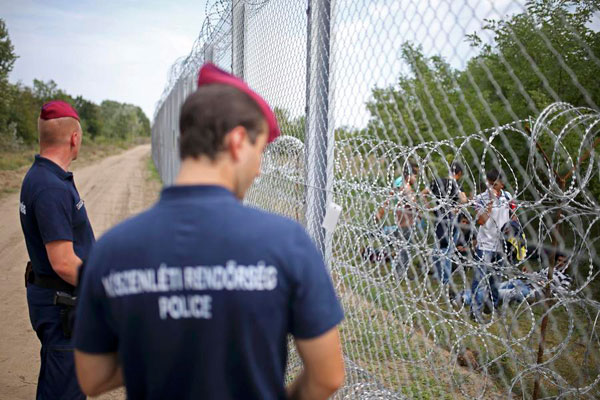 |
|
Policemen watch as migrants walk on the other side of the border from Serbia near Asttohatolom, Hungary September 15, 2015. [Photo/Agencies] |
SERBIAN-HUNGARIAN BORDER - Hungary's right-wing government shut the main land route for migrants into the EU on Tuesday, taking matters into its own hands to halt Europe's influx of refugees.
An emergency effort led by Germany to force European Union member states to accept mandatory quotas of refugees collapsed in discord. Berlin called for financial penalties against countries that refused to accommodate their share of migrants,drawing a furious response from central Europe.
A Czech official accused Berlin of making empty threats while Slovakia said such penalties would bring the "end of the EU".
Under new rules that took effect from midnight, Hungary said anyone seeking asylum at its border with Serbia, the EU's external frontier, would automatically be turned back. Any one trying to sneak through would face jail.
In scenes with echoes of the Cold War, families with smallchildren sat in fields beneath the former communist country's new 3.5-metre (10 foot) high fence, which runs almost the length of the border, topped with razor wire.
Prime Minister Viktor Orban, one of the continent's loudest opponents of mass immigration, says he is acting to save Europe's "Christian values" by blocking the main overland route used by mainly Muslim refugees, who travel through the Balkans and cross his country mainly to reach Germany or Sweden.
Hundreds of thousands of people have been arriving at the EU's southern and eastern edges and making their way to the richer countries further north and west in the greatest migration to Western Europe since World War Two.
The influx has created an institutional crisis for the 28-member EU, with one of the bloc's signature achievements, its Schengen system of border-free travel across much of the continent, unravelling this week under the strain.
Record arrivals forced Germany to reimpose emergency frontier controls this week, with several neighbours swiftly following suit.
Germany and other relatively open countries say Europe has amoral obligation to accept refugees, and other EU states must be required to do their part.
Eastern European countries argue that a more welcoming stance encourages more people to make dangerous voyages, and risks attracting an uncontrolled influx that would overwhelm social welfare systems and dilute national cultures.
Under its new rules, Hungary said it will now automatically turn back refugees who arrive by land over the main route from Serbia, a country it has declared "safe". Asylum claims would be processed within eight days and those at the Serbian border should be rejected within hours.
"If someone is a refugee, we will ask them whether they have submitted an asylum request in Serbia. If they had not done so, given that Serbia is a safe country, they will be rejected," Orban was quoted as telling private broadcaster TV2 on Monday.
"We will start a new era," government spokesman Zoltan Kovacs said shortly after midnight on the border. "We will stop the inflow of illegal migrants over our green borders."
Serbia called the new Hungarian rules "unacceptable". The United Nations disputed the definition of Serbia as safe, saying the poor ex-Yugoslav state lacked capacity to house thousands of refugees turned back at Europe's gates.
Orban says that by reinforcing the EU's external border his government is merely enforcing EU rules, and that no countries are duty-bound to take in refugees that pass through safe states. Critics at home and in European neighbours say some of his rhetoric has crossed a line into alarmism and xenophobia.
Long queues formed in no-man's land at metal containers built into the fence, where migrants were expected to register, though only a handful were seen entering. They had spent the night in the open, given tents, food and water by aid workers.
Nine Syrians and seven Afghans were detained by police and faced possible imprisonment on suspicion of breaching the fence, the first arrests under the new rules.